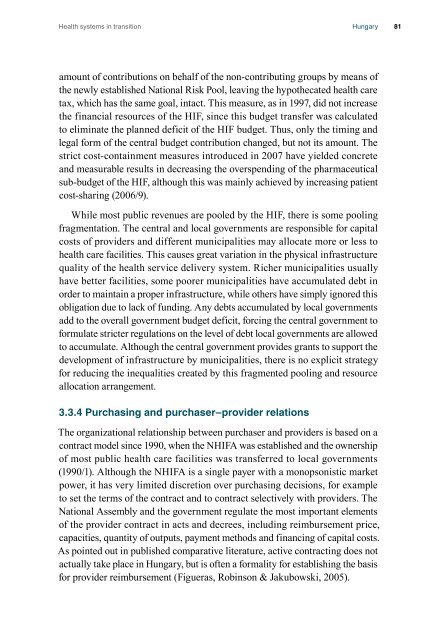Health Systems in Transition - Hungary - World Health Organization ...
Health Systems in Transition - Hungary - World Health Organization ...
Health Systems in Transition - Hungary - World Health Organization ...
Create successful ePaper yourself
Turn your PDF publications into a flip-book with our unique Google optimized e-Paper software.
<strong>Health</strong> systems <strong>in</strong> transition <strong>Hungary</strong> 81<br />
amount of contributions on behalf of the non-contribut<strong>in</strong>g groups by means of<br />
the newly established National Risk Pool, leav<strong>in</strong>g the hypothecated health care<br />
tax, which has the same goal, <strong>in</strong>tact. This measure, as <strong>in</strong> 1997, did not <strong>in</strong>crease<br />
the f<strong>in</strong>ancial resources of the HIF, s<strong>in</strong>ce this budget transfer was calculated<br />
to elim<strong>in</strong>ate the planned deficit of the HIF budget. Thus, only the tim<strong>in</strong>g and<br />
legal form of the central budget contribution changed, but not its amount. The<br />
strict cost-conta<strong>in</strong>ment measures <strong>in</strong>troduced <strong>in</strong> 2007 have yielded concrete<br />
and measurable results <strong>in</strong> decreas<strong>in</strong>g the overspend<strong>in</strong>g of the pharmaceutical<br />
sub-budget of the HIF, although this was ma<strong>in</strong>ly achieved by <strong>in</strong>creas<strong>in</strong>g patient<br />
cost-shar<strong>in</strong>g (2006/9).<br />
While most public revenues are pooled by the HIF, there is some pool<strong>in</strong>g<br />
fragmentation. The central and local governments are responsible for capital<br />
costs of providers and different municipalities may allocate more or less to<br />
health care facilities. This causes great variation <strong>in</strong> the physical <strong>in</strong>frastructure<br />
quality of the health service delivery system. Richer municipalities usually<br />
have better facilities, some poorer municipalities have accumulated debt <strong>in</strong><br />
order to ma<strong>in</strong>ta<strong>in</strong> a proper <strong>in</strong>frastructure, while others have simply ignored this<br />
obligation due to lack of fund<strong>in</strong>g. Any debts accumulated by local governments<br />
add to the overall government budget deficit, forc<strong>in</strong>g the central government to<br />
formulate stricter regulations on the level of debt local governments are allowed<br />
to accumulate. Although the central government provides grants to support the<br />
development of <strong>in</strong>frastructure by municipalities, there is no explicit strategy<br />
for reduc<strong>in</strong>g the <strong>in</strong>equalities created by this fragmented pool<strong>in</strong>g and resource<br />
allocation arrangement.<br />
3.3.4 Purchas<strong>in</strong>g and purchaser–provider relations<br />
The organizational relationship between purchaser and providers is based on a<br />
contract model s<strong>in</strong>ce 1990, when the NHIFA was established and the ownership<br />
of most public health care facilities was transferred to local governments<br />
(1990/1). Although the NHIFA is a s<strong>in</strong>gle payer with a monopsonistic market<br />
power, it has very limited discretion over purchas<strong>in</strong>g decisions, for example<br />
to set the terms of the contract and to contract selectively with providers. The<br />
National Assembly and the government regulate the most important elements<br />
of the provider contract <strong>in</strong> acts and decrees, <strong>in</strong>clud<strong>in</strong>g reimbursement price,<br />
capacities, quantity of outputs, payment methods and f<strong>in</strong>anc<strong>in</strong>g of capital costs.<br />
As po<strong>in</strong>ted out <strong>in</strong> published comparative literature, active contract<strong>in</strong>g does not<br />
actually take place <strong>in</strong> <strong>Hungary</strong>, but is often a formality for establish<strong>in</strong>g the basis<br />
for provider reimbursement (Figueras, Rob<strong>in</strong>son & Jakubowski, 2005).
















